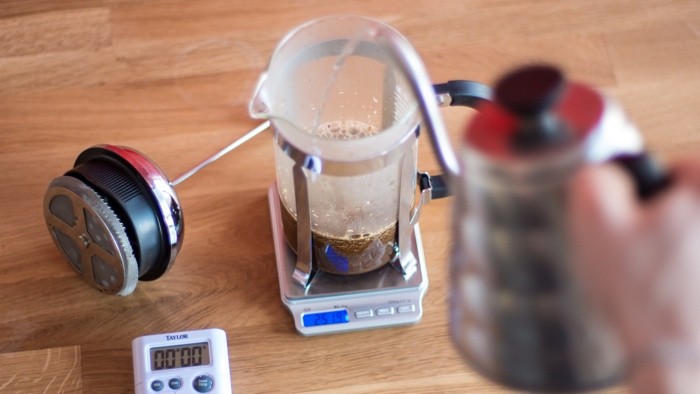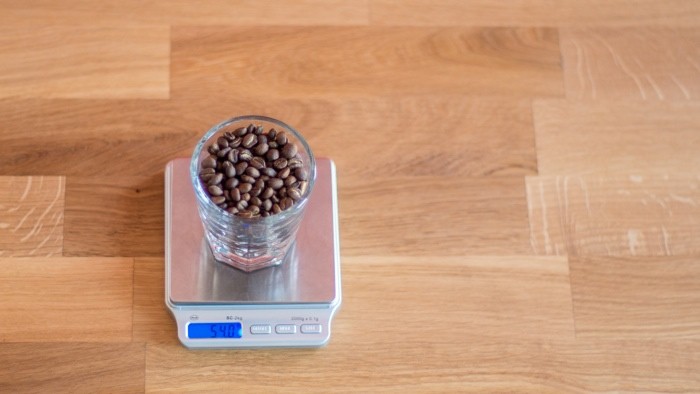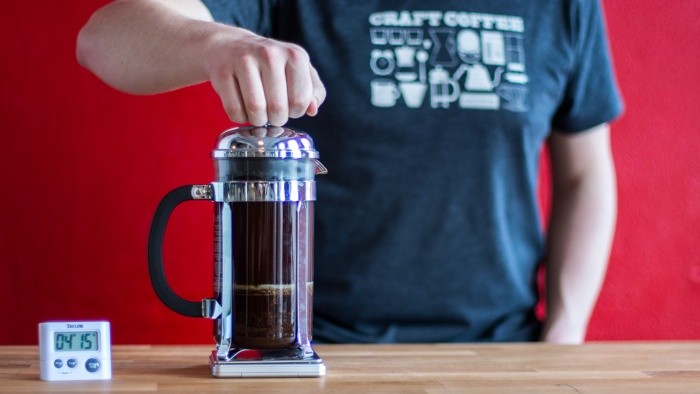How much coffee for French press is a question many coffee lovers ask to achieve the perfect brew. At HOW.EDU.VN, we provide expert guidance on coffee preparation and brewing methods, helping you unlock the full potential of your French press. Discover the ideal coffee-to-water ratio, grind size, and brewing time for a rich, flavorful cup.
1. Understanding the French Press Brewing Method
The French press, also known as a cafetière, is a simple yet elegant brewing device that immerses coffee grounds in hot water. Unlike drip coffee makers that use paper filters, the French press utilizes a metal mesh filter, allowing more of the coffee’s natural oils and sediments to pass through, resulting in a richer, fuller-bodied brew. This method offers a unique coffee experience, emphasizing the coffee’s origin and flavor profile.
1.1. The Importance of Coffee-to-Water Ratio
Achieving the perfect cup of French press coffee starts with understanding the coffee-to-water ratio. This ratio is crucial because it directly impacts the strength and flavor of your brew. Too little coffee, and you’ll end up with a weak, watery cup. Too much coffee, and the result can be an overly strong, bitter brew. Balancing this ratio ensures a harmonious extraction, highlighting the coffee’s best qualities.
1.2. Grind Size Matters
The grind size is another critical factor in French press brewing. A coarse grind is essential because it prevents the coffee grounds from passing through the metal filter and ending up in your cup. Fine grounds will not only make your coffee gritty but can also lead to over-extraction, resulting in a bitter taste. A consistent, coarse grind ensures a clean, sediment-free cup with a balanced flavor profile.
2. Determining the Right Amount of Coffee
Finding the right amount of coffee for your French press depends on several factors, including the size of your French press, your preferred coffee strength, and the coffee’s roast level. Here’s a detailed guide to help you determine the perfect coffee-to-water ratio for your French press.
2.1. The Golden Ratio: 1:15 to 1:18
The “golden ratio” for French press coffee is generally considered to be between 1:15 and 1:18, meaning one part coffee to 15 to 18 parts water. This ratio provides a balanced extraction, highlighting the coffee’s natural flavors without being too strong or weak. Experimenting within this range allows you to fine-tune the strength to your personal preference.
2.2. Measuring Coffee and Water
Accurate measurements are key to consistent, delicious French press coffee. Use a kitchen scale to weigh both the coffee grounds and the water. This ensures precision and eliminates guesswork. Measuring by volume (e.g., tablespoons or cups) can be inconsistent due to variations in coffee density and grind size.
2.3. Calculating Coffee Amounts for Different French Press Sizes
Here’s a table to guide you on how much coffee to use for different French press sizes, based on the 1:15 to 1:18 ratio:
| French Press Size (ml) | French Press Size (oz) | Coffee (grams) at 1:15 Ratio | Coffee (grams) at 1:18 Ratio |
|---|---|---|---|
| 350 ml | 12 oz | 23 g | 19 g |
| 500 ml | 17 oz | 33 g | 28 g |
| 1000 ml | 34 oz | 67 g | 56 g |



2.4. Adjusting for Coffee Strength Preferences
If you prefer a stronger cup of coffee, use a ratio closer to 1:15. For a milder brew, opt for a ratio closer to 1:18. You can also adjust the ratio based on the coffee’s roast level. Darker roasts tend to extract more easily, so you may want to use slightly less coffee. Lighter roasts, on the other hand, may benefit from a slightly higher coffee-to-water ratio.
3. Step-by-Step Guide to Brewing French Press Coffee
Brewing French press coffee is a straightforward process, but attention to detail can significantly enhance the final result. Follow these steps for a consistently delicious cup:
3.1. Gather Your Equipment
Before you begin, make sure you have all the necessary equipment:
- French press
- Coffee grinder (burr grinder recommended)
- Kitchen scale
- Kettle
- Thermometer
- Timer
- Spoon or paddle
3.2. Heat the Water
Heat water to around 200-205°F (93-96°C). Use a thermometer to ensure accuracy. If you don’t have a thermometer, bring the water to a boil and then let it sit for about 30 seconds before pouring.
3.3. Grind the Coffee
Grind your coffee beans to a coarse consistency. The grounds should resemble sea salt. Avoid using a blade grinder, as it produces an inconsistent grind that can negatively impact the flavor.
3.4. Pre-Heat the French Press
Pre-heat the French press by rinsing it with hot water. This helps maintain a stable brewing temperature. Discard the rinse water before adding the coffee grounds.
3.5. Add Coffee and Water
Add the ground coffee to the French press. Pour a small amount of hot water over the grounds, just enough to saturate them. This is called the “bloom.” Let it bloom for about 30 seconds.
3.6. Pour Remaining Water
After the bloom, slowly pour the remaining hot water over the coffee grounds, ensuring they are evenly saturated.
3.7. Stir Gently
Gently stir the coffee and water mixture to ensure all the grounds are fully immersed.
3.8. Brew
Place the lid on the French press, but do not press the plunger down. Let the coffee brew for 4 minutes.
3.9. Press Slowly
After 4 minutes, slowly press the plunger down, applying steady, even pressure. Avoid pressing too quickly, as this can result in a muddy, over-extracted brew.
3.10. Serve Immediately
Pour the coffee immediately after pressing. Leaving the coffee in the French press can lead to over-extraction and a bitter taste.
4. Factors Affecting Coffee Strength
Several factors can influence the strength and flavor of your French press coffee. Understanding these factors allows you to make adjustments and fine-tune your brewing process.
4.1. Coffee Bean Type
The type of coffee bean you use can significantly impact the flavor and strength of your brew. Arabica beans are known for their smooth, aromatic flavor, while Robusta beans are bolder and more caffeinated. Experiment with different bean varieties to find your preferred flavor profile.
4.2. Roast Level
The roast level affects the coffee’s acidity, body, and flavor. Lighter roasts tend to be more acidic and have a brighter flavor, while darker roasts are bolder, more bitter, and have a heavier body. Adjust the coffee-to-water ratio based on the roast level to achieve a balanced extraction.
4.3. Water Quality
The quality of water you use can also impact the taste of your coffee. Use filtered water to remove impurities and chlorine, which can negatively affect the flavor. Avoid using distilled or softened water, as they lack the minerals needed for proper extraction.
4.4. Brewing Time
Brewing time is a critical factor in French press brewing. Under-extraction can result in a sour, weak cup, while over-extraction can lead to a bitter, harsh taste. Stick to the recommended 4-minute brewing time for optimal results.
5. Troubleshooting Common French Press Issues
Even with the best techniques, you may encounter some common issues when brewing French press coffee. Here are some tips to troubleshoot these problems:
5.1. Bitter Coffee
- Cause: Over-extraction, fine coffee grounds, water temperature too high.
- Solution: Use a coarser grind, reduce brewing time, lower water temperature, and ensure accurate coffee-to-water ratio.
5.2. Weak Coffee
- Cause: Under-extraction, not enough coffee grounds, water temperature too low.
- Solution: Increase coffee-to-water ratio, increase brewing time, ensure water temperature is within the ideal range, and use high-quality coffee beans.
5.3. Muddy Coffee
- Cause: Fine coffee grounds, pressing the plunger too quickly.
- Solution: Use a coarser grind, press the plunger slowly and evenly, and avoid disturbing the coffee grounds while pouring.
5.4. Gritty Coffee
- Cause: Fine coffee grounds, damaged French press filter.
- Solution: Use a coarser grind, inspect and replace the French press filter if necessary, and avoid overfilling the French press.
6. Advanced Techniques for French Press Brewing
For those looking to elevate their French press brewing game, here are some advanced techniques to experiment with:
6.1. The Rao Spin
The Rao Spin, named after coffee expert Scott Rao, involves gently spinning the coffee grounds after pouring the water to ensure even saturation. This technique helps to release trapped gases and improve extraction.
6.2. Decanting
Decanting involves pouring the brewed coffee into a separate vessel immediately after pressing. This prevents over-extraction and ensures a cleaner, more flavorful cup.
6.3. Temperature Control
Precise temperature control is crucial for optimal extraction. Use a variable temperature kettle to heat the water to the exact temperature recommended for your coffee beans.
6.4. Coffee Bean Storage
Proper coffee bean storage is essential for maintaining freshness and flavor. Store your beans in an airtight container away from light, heat, and moisture. Grind your beans just before brewing for the best results.
7. Choosing the Right Coffee Beans for French Press
Selecting the right coffee beans is a crucial step in achieving the perfect cup of French press coffee. Different beans offer unique flavor profiles and characteristics that can greatly enhance your brewing experience. Here’s a guide to help you choose the best coffee beans for your French press.
7.1. Single-Origin vs. Blends
- Single-Origin: These beans come from a single farm, region, or cooperative, offering a unique and distinct flavor profile. They are ideal for those who want to explore the nuanced flavors of specific coffee-growing regions.
- Blends: Blends combine beans from different origins to create a balanced and consistent flavor. They are a great option for those who prefer a more familiar and approachable taste.
7.2. Roast Level Considerations
- Light Roast: Lightly roasted beans retain more of their original flavor characteristics, offering bright acidity and complex aromas. They are a good choice for those who enjoy a more nuanced and delicate cup of coffee.
- Medium Roast: Medium roasted beans offer a balance between acidity and body, with a smooth and balanced flavor. They are a versatile option that works well with the French press brewing method.
- Dark Roast: Darkly roasted beans have a bold, smoky flavor with a heavy body and low acidity. They are a good choice for those who prefer a strong and robust cup of coffee.
7.3. Coffee Bean Varieties
- Arabica: Arabica beans are known for their smooth, aromatic flavor and lower caffeine content. They are the most popular type of coffee bean and offer a wide range of flavor profiles.
- Robusta: Robusta beans have a stronger, more bitter flavor and higher caffeine content. They are often used in espresso blends and can add a bold kick to your French press coffee.
7.4. Freshness Matters
Regardless of the type of bean you choose, freshness is key to a delicious cup of coffee. Look for beans that have been recently roasted and store them properly to maintain their flavor.
8. Maintaining Your French Press
Proper maintenance is essential for keeping your French press in top condition and ensuring consistent brewing results. Here are some tips for cleaning and maintaining your French press.
8.1. Cleaning After Each Use
- Rinse Thoroughly: After each use, disassemble your French press and rinse all the components with hot water.
- Remove Coffee Grounds: Dispose of the used coffee grounds in a trash can or compost bin. Avoid pouring them down the drain, as they can clog your plumbing.
8.2. Deep Cleaning
- Disassemble: Disassemble the French press completely, separating the glass beaker, metal frame, plunger, and filter.
- Wash with Soap: Wash all the components with warm, soapy water. Use a soft sponge or brush to remove any stubborn stains or residue.
- Rinse Thoroughly: Rinse all the components thoroughly with hot water to remove any traces of soap.
- Dry Completely: Allow all the components to air dry completely before reassembling.
8.3. Descaling
- Vinegar Solution: Fill the glass beaker with a solution of equal parts white vinegar and water.
- Soak: Allow the solution to soak for several hours or overnight.
- Scrub: Use a soft brush or sponge to scrub away any mineral deposits or stains.
- Rinse Thoroughly: Rinse the beaker thoroughly with hot water to remove any traces of vinegar.
8.4. Filter Maintenance
- Inspect Regularly: Inspect the filter regularly for any signs of damage or wear.
- Replace When Necessary: Replace the filter if it is damaged or no longer functioning properly.
- Cleaning: Disassemble the filter and wash each component with warm, soapy water. Rinse thoroughly and allow to air dry before reassembling.
9. Expert Tips for the Perfect French Press Brew
To achieve the ultimate French press coffee, consider these expert tips:
9.1. Invest in a Burr Grinder
A burr grinder provides a consistent grind size, which is essential for optimal extraction. Avoid using a blade grinder, as it produces an inconsistent grind that can negatively impact the flavor.
9.2. Use a Kitchen Scale
Accurate measurements are key to consistent, delicious French press coffee. Use a kitchen scale to weigh both the coffee grounds and the water.
9.3. Experiment with Different Coffee Beans
Explore different coffee beans and roast levels to find your preferred flavor profile. Single-origin beans offer unique and distinct flavors, while blends provide a balanced and consistent taste.
9.4. Control Water Temperature
Precise temperature control is crucial for optimal extraction. Use a thermometer to ensure the water is within the ideal range of 200-205°F (93-96°C).
9.5. Bloom the Coffee
Blooming the coffee releases trapped gases and enhances the flavor. Pour a small amount of hot water over the grounds and let it sit for about 30 seconds before adding the remaining water.
9.6. Stir Gently
Gently stir the coffee and water mixture to ensure all the grounds are fully immersed. Avoid stirring too vigorously, as this can disrupt the extraction process.
9.7. Brew for Four Minutes
Brew the coffee for four minutes to achieve optimal extraction. Under-extraction can result in a sour, weak cup, while over-extraction can lead to a bitter, harsh taste.
9.8. Press Slowly
Press the plunger slowly and evenly to avoid disturbing the coffee grounds. Applying too much pressure can result in a muddy, over-extracted brew.
9.9. Serve Immediately
Pour the coffee immediately after pressing to prevent over-extraction. Leaving the coffee in the French press can lead to a bitter taste.
9.10. Clean Your French Press Regularly
Proper maintenance is essential for keeping your French press in top condition and ensuring consistent brewing results. Clean your French press after each use and perform a deep cleaning regularly.
10. Why Choose HOW.EDU.VN for Your Coffee Brewing Questions?
At HOW.EDU.VN, we understand the challenges you face in achieving the perfect cup of coffee. Finding reliable information and expert guidance can be time-consuming and overwhelming. That’s why we’ve assembled a team of over 100 world-renowned PhDs and experts ready to provide personalized advice and solutions.
10.1. Connect with Leading Experts
Our platform connects you directly with coffee brewing experts who can answer your specific questions and provide tailored recommendations. Whether you’re struggling with grind size, coffee-to-water ratios, or brewing techniques, our experts are here to help.
10.2. Personalized Advice
Our experts offer personalized advice based on your unique preferences and needs. We take the time to understand your challenges and provide solutions that are tailored to your specific situation.
10.3. Save Time and Money
By connecting with our experts, you can save time and money by avoiding costly mistakes and experimenting with unreliable information. Our experts provide efficient, effective solutions that help you achieve the perfect cup of coffee every time.
10.4. Secure and Reliable Information
We understand the importance of trust and reliability. That’s why we ensure that all our experts are vetted and provide accurate, up-to-date information. Your consultations are confidential and secure, giving you peace of mind.
10.5. Practical Solutions
Our experts provide practical, actionable solutions that you can implement immediately. Whether you need help troubleshooting common brewing issues or want to explore advanced techniques, our experts are here to guide you every step of the way.
FAQ: French Press Coffee
1. What is the best coffee-to-water ratio for French press?
The ideal ratio is between 1:15 and 1:18 (coffee:water). Experiment to find your preferred strength.
2. What grind size should I use for French press?
Use a coarse grind, similar to sea salt, to prevent sediment in your coffee.
3. How long should I brew French press coffee?
Brew for 4 minutes for optimal extraction and flavor.
4. Why is my French press coffee bitter?
Over-extraction, fine grounds, or water that is too hot can cause bitterness.
5. Why is my French press coffee weak?
Under-extraction, too little coffee, or water that is not hot enough can cause weakness.
6. How do I clean my French press?
Disassemble and rinse after each use. Deep clean with soap and water regularly.
7. Can I use pre-ground coffee in a French press?
Yes, but freshly ground coffee is recommended for the best flavor.
8. What water temperature is best for French press?
Use water between 200-205°F (93-96°C) for optimal extraction.
9. How do I prevent sediment in my French press coffee?
Use a coarse grind, avoid disturbing the grounds while pouring, and press slowly.
10. What are the best coffee beans for French press?
Experiment with different single-origin beans and blends to find your preferred flavor profile.
Unlock the secrets to perfect French press coffee with expert guidance from HOW.EDU.VN. Our team of PhDs is ready to answer your questions and provide personalized solutions to all your coffee brewing challenges.
Contact us today for a consultation:
Address: 456 Expertise Plaza, Consult City, CA 90210, United States
WhatsApp: +1 (310) 555-1212
Website: HOW.EDU.VN
Are you struggling to achieve the perfect brew? Do you find yourself constantly searching for answers to your coffee-related questions? At how.edu.vn, we understand these challenges and offer a solution: direct access to over 100 world-renowned PhDs ready to provide personalized advice and solutions.
Don’t let brewing frustrations hold you back. Contact us today and experience the difference expert guidance can make. Our team is ready to help you unlock the full potential of your French press and elevate your coffee brewing skills.
